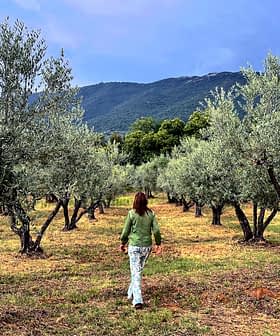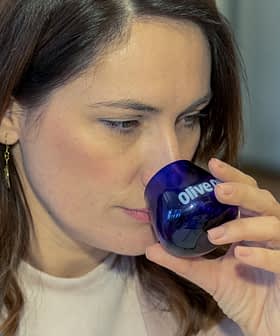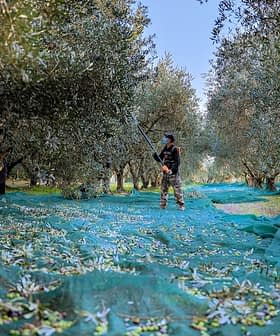The 1,000-Member Co-Op Taking on The Challenging Terrain of Northern Portugal

About 1,000 Portuguese farmers celebrated news of two awards at the 2024 NYIOOC World Olive Oil Competition.
The farmers are members of the Agricultural Cooperative of Olive Growers of Murça (CAOM), which earned Silver Awards for a medium-intensity blend and delicate Cordovil at the World Competition.
The search for high quality was the answer to the challenges of this region and the higher costs associated with the mountainous environment.
“Our goal in participating in the NYIOOC was to inform people about the extraordinary quality of our Azeite Porca de Murça brand and the work behind such excellence,” said Francisco António Vilela Ribeiro, the cooperative’s chairman of the board of directors.
“NYIOOC is a contest with very demanding analysis criteria and great feedback,” he added. “There are many national and international contests, but winning in New York is special.”
See Also:Producer ProfilesWhile CAOM has consistently achieved success at the World Competition since 2020, the cooperative has been uniting a large community of farmers in the northeastern Portuguese region of Trás-os-Montes since 1956.
“It started in the 1990s when the Cooperative focused on producing high-quality extra virgin olive oil,” Vilela Ribeiro said.
“The search for high quality was the answer to the challenges of this region and the higher costs associated with the mountainous environment, the extensive orchards and the dryland farming practices,” he added.
The cooperative now sells more than 500,000 liters of its Azeite Porca de Murça brand nationally and internationally.
None of the almost 1,000 members of the cooperative have irrigated olive groves, all of which are traditionally spaced. CAOM estimated that, on average, these growers incur three times the expenses of the average super-intensive grower.
These conditions have led CAOM to develop alternative revenue streams, including its dedicated museum, the starting point for the cooperative’s guided tours.
“The main challenge for these producers is to educate new consumers about the benefits of consuming virgin olive oils instead of other vegetable oils,” Vilela Ribeiro said.
“Extra virgin olive oil is unique, and no food or medicine can replace it,” he added. “It is crucial for our health. We need more consumers who are better informed about this.”
Valuing the unique relationship between the land and the farmers’ work is crucial for the cooperative’s present and future.
“With higher production costs, giving our work value means maintaining areas that are already depopulated and risk being abandoned,” Vilela Ribeiro said.

CAOM’s museum serves as another revenue source for the cooperative while educating visitors on olive oil production. (Photo: CAOM)
The cooperative’s olive groves are spread across an 189-square-kilometer area in the Murça municipality. CAOM focuses on the four local varieties – Cordovil, Cobrançosa, Madural, and Verdeal – included in the Trás-os-Montes Protected Designation of Origin (PDO) certification awarded by the European Union.
According to the technical summary published by the European Commission, Trás-os-Montes PDO extra virgin olive oil is balanced, with aromas and flavors of fresh fruit and sometimes almonds. The oil is notably sweet, green, bitter and spicy, characteristics that make it stand out from other olive oils in the country.
“The olive oil we produce has a very specific identity – its terroir – because Murça is the epicenter of the three microclimates of the Transmontana region: Terra Quente, Terra Fria and Terra de Montanha,” Vilela Ribeiro said.
“This means we have three regions with very distinct climates, ranging from the narrow valleys of the Tua and Tinhela rivers, with olive groves bordering the vineyards of the Douro demarcated region, to the more mountainous areas where olive groves compete with chestnut cultivation,” he added.
Vilela Ribeiro noted that “the cooperative has been a pioneer” due to its vertically integrated control of the entire production chain over the past 30 years, ensuring that every step from harvest to packaging is done according to the highest standards.
The communal olive mill, which was started by the cooperative members when it was founded, has been the lynchpin of the operation.
“It became key to the economy of an inland municipality of Portugal, with a challenging topography for farming,” Vilela Ribeiro said. “It also allows small olive producers to scale up, which would otherwise be impossible.”
See Also:Olive Oil Producers in Portugal Celebrate Country’s Second-Highest YieldAccording to CAOM, the cooperative demonstrates the world-class quality of traditional olive farming because of its culture inspired by community and teamwork.
“The fact that our members truly nurture a cooperative spirit of solidarity and sharing made us the only case in Portugal where the valuation of what they produce is not only based on the olive yield but on the actual quality of the fruit itself,” Vilela Ribeiro said.
“By looking at the fruits, we can also decide when it is the best time to start harvesting,” he added. “Thanks to our modern olive mill, we can schedule the work to deliver the fruit to us in less than 24 hours from harvesting.”
The weather is not always on the growers’ side, though.
“This year, due to climate change and extreme weather phenomena experienced throughout the Mediterranean region, as well as an autumn with lots of rain, production was lower and more difficult,” Vilela Ribeiro said.
“On average, we need 1.5 kilograms more olives to produce the same liter of olive oil,” he added. “When compared to the previous season, production was again low, with lower yields, which further impacted the total production in the region.”
Looking ahead to the 2024/25 harvest, Vilela Ribeiro said he also expects to face more challenges.
“Extreme phenomena such as heavy rains, hailstorms or heat waves jeopardize both flowering and fruit set, making it difficult to anticipate any scenario for the next olive season,” he said.








